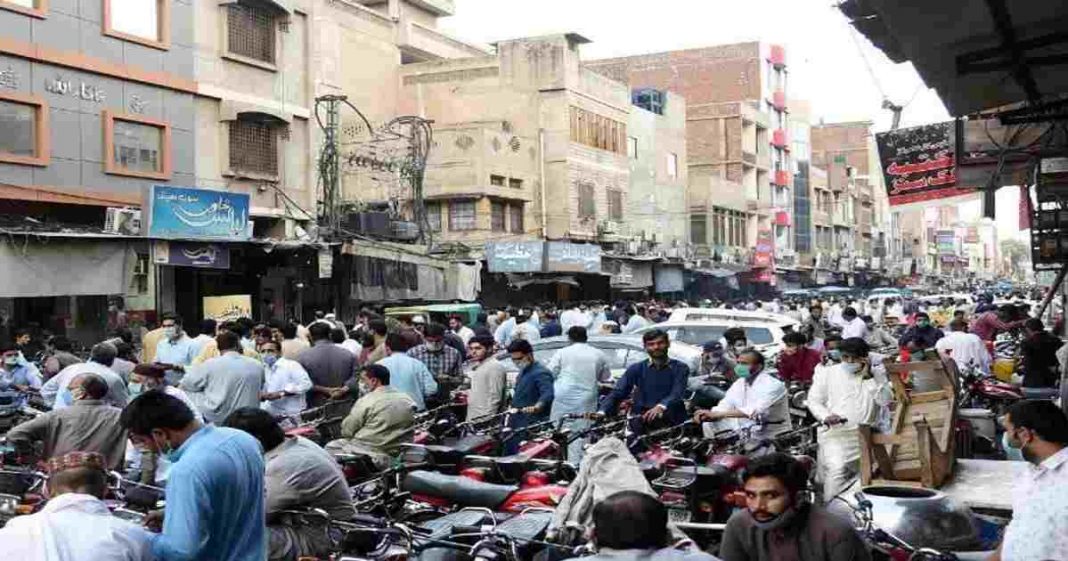During the last monsoon, we have observed the phenomenon of urban flooding in Karachi. Unusual rains flooded almost the whole of the city. The level of rainwater raised nearly five to six feet in most areas and in some parts of the city it was nearly ten feet. The actual problem was that the drainage infrastructure of the city was choked and its main reason was overpopulation.
The natural drain of this terrain, the Malir River, was badly clogged because of illegal constructions. The city authorities remained completely unconcerned about these illegal acts and the people of Karachi had to pay the price. If we look at these things closely, we find many such issues in other big cities like Faisalabad.
Faisalabad, the third-largest city of Pakistan, is a metropolitan with an urban population of more than four million. This is the first planned city of Pakistan and once was a well-managed city. When its architecture was designed by Sir Ganga Ram in 1904, the main objective was to establish a big grain market in the area. Later on, this city became a major industrial hub which accelerated its growth.
Read more: Faisalabad’s industrial community donates 4 million to Corona relief fund
Problems of urbanization in Faisalabad
As a big city, Faisalabad needs a lot of facilities but due to lack of planning, the intensity of problems is increasing with the increasing population. These are the problems of urbanization.
As far as Faisalabad is concerned, it is facing all types of issues of urbanization. Pollution, over-population, heaps of litter, epidemics, drinking water, un-managed traffic, lack of health and education facilities are all issues of urbanization. City authorities are very weak and cannot take solid steps for finding the solution.
If any unusual threat comes ahead, it would be disastrous just like urban flooding as a result of monsoon rain because the city authorities have no workable plan to face it. The city may be inundated by floodwater just like Karachi.
Read more: 12 killed as flooding paralyses Karachi
Although Faisalabad has a better drainage system than Karachi, the drainage system still fails to work during an emergency. The streets are flooded with sewerage water even on common days and perhaps its most important reason is the poor solid waste management system.
It shows the weakness of the system. The same is the case for other calamities. The lack of planning is our major issue. This will lead to an increase in damage to lives, property, and assets.
The question is what are the solutions? A one-word answer is a ‘better administration’. But how? Simply, in my opinion, the formation of local governments. Unfortunately, all the elected governments ignored them. This is the best solution and this needs to be adopted.
Read more: Focusing on provincial governments and territories – I
Overall, crime increases with urbanization – measured here by population density. The two most urbanized districts in Punjab, Lahore and Faisalabad, had almost twice the crime level per capita than rural districts between 1991 and 2015. pic.twitter.com/7AhOImQAJS
— IDEAS (@IDEASpak) November 24, 2017
Importance of local bodies system
The local bodies system was introduced in the sub-continent in 1884 by Viceroy Lord Rippon with the name of ‘Local Boards’. Its purpose was to involve the local people to solve their own problems. With the passage of time, the British introduced new amendments in order to improve it, however, this process was slow.
This system is very much developed in most democracies because along with other benefits, it works as a nursery for fresh and emerging political leadership. We observed an opposite phenomenon in this regard in Pakistan. All our political parties including PPP, PTI, PML(N), and even other smaller ones like JUI and Jamat-e-Islami, not only ignored but also tried to suppress the local bodies during their days of power in government.
In contrast, during dictatorships, this system was promoted. Ayub Khan introduced the Basic Democracies (BD) system. Zia-ul-Haq held elections of local bodies two times during his period. In my opinion, Musharraf was most successful in this regard. He introduced the Devolution of Power Plan with the objective of empowering the common people so that they can solve their problems. He followed the Turkish model and established a system by the name ‘District Government’.
Read more: Musharraf Hero of Pakistan: Top trend on social media
This system provided the common man with a chance to take part in elections regardless of his social, political, and economic status. Union, Town, and District councils were elected which were highly capable of solving rural and urban problems. But after the end of his government, his system was set aside by elected democratic governments of PPP and PML(N).
Similar behavior is shown by PTI as it has not yet established any system of local government. During the last fifteen years, only two local bodies’ elections were held because the present political leadership does not want to give any type of powers to local bodies.
The good thing is that our people are getting political maturity and they are learning how to solve their problems, hence the political parties are under pressure to work on these lines. I think the local bodies system will be on a smooth path very soon.
Read more: Pakistan’s system of governance is tailor-made for strife
Musharraf’s system of District Governments was the most effective. The new system should be on these lines. This will lead us to solve issues of urbanization in cities like Faisalabad and Karachi.
The author is a lecturer in Pak. Studies and Head of Social Studies Department at the University of Central Punjab, Faisalabad Campus. The views expressed in the article are the author’s own and do not necessarily reflect the editorial policy of Global Village Space.














